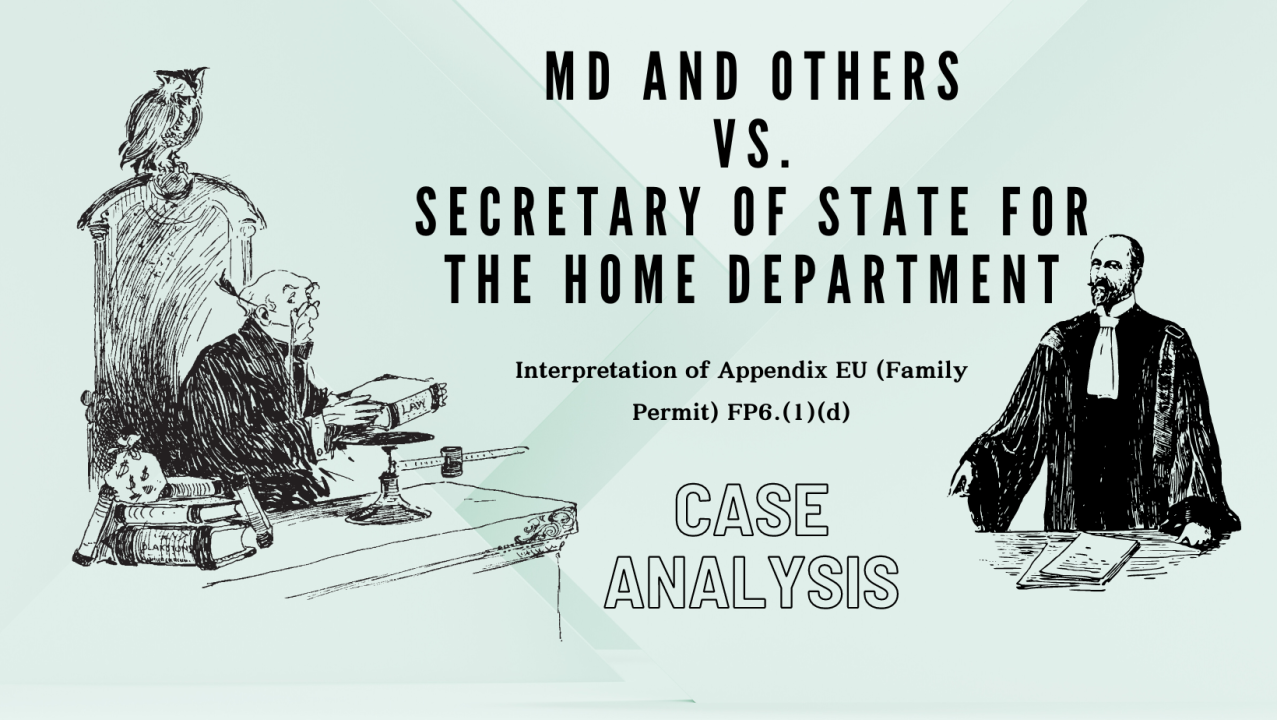The appellants, MD, MSD, and JD, are siblings and children of Mr. Duah and Ms. Felicia Pokuaa. Mr Duah moved to the UK in April 2014, leaving the appellants in Ghana with their mother. In March 2017, Mr Duah married Lydia Afua Opoku from the Netherlands and subsequently received an EEA Residence Card in July 2019. Ms Opoku was granted settled status in the UK in August 2020.
In December 2020, the appellants applied for entry clearance to the UK under Appendix EU (Family Permit). They were granted an EU Settlement Scheme family permit in November 2021 and arrived in the UK in December 2021. However, upon their arrival, the Secretary of State for the Home Department issued a ‘Notice of Cancellation of Leave to Enter,’ stating that the appellants’ eligibility for entry clearance had changed because Lydia Afua Opoku, the sponsor, was not in the UK or accompanying them. Ms. Opoku, when interviewed, stated that she did not sponsor the appellants’ applications and was unwilling to do so.
Summary of Proceedings
First-tier Tribunal Decision (Judge Phull)
On 5 September 2020, Judge Phull allowed the appellants’ appeals. He determined that the appellants met the requirements of Appendix EU (Family Permit) by joining their father and Ms Opoku, an EEA citizen, in the UK.
Upper Tribunal Decision (Judge Lane)
The respondent appealed to the Upper Tribunal, arguing that Judge Phull misinterpreted the guidance concerning FP6(1)(c) and FP6(1)(d) of Appendix EU (Family Permit). The Upper Tribunal granted permission to appeal, noting the term ‘joining’ might imply that the applicant should reside with the sponsor in the UK, not just be in the UK simultaneously.
The appellants countered, supporting Judge Phull’s interpretation, arguing that the guidance only requires the EEA citizen’s presence in the UK and does not mandate cohabitation or a continued relationship.
Relevant Legal Framework
Appendix EU (Family Permit)
- The applicant must not be a British citizen.
- The applicant must be a family member of a relevant EEA citizen.
- The relevant EEA citizen must be resident in the UK or will travel to the UK with the applicant within six months.
- The applicant will be accompanying or joining the relevant EEA citizen in the UK within six months.
- The applicant should not be the spouse, civil partner, or durable partner of a relevant EEA citizen who has been granted entry clearance.
- The definition of a “family member of a relevant EEA citizen” is provided in Annex 1.
- Paragraph A.3.4 (c) addresses the cancellation of leave to enter based on a change in circumstances relevant to eligibility.
Decision: Proper Construction of FP6.(1)(d) of Appendix EU (Family Permit)
- Eligibility requirements must be satisfied at the date of application.
- FP6.(1)(c) focuses on the relevant EEA citizen being resident in the UK or travelling to the UK.
- FP6.(1)(d) requires the applicant to accompany or join the relevant EEA citizen in the UK.
- The word “joining” should be interpreted as being united or reunited with the relevant EEA citizen.
- The guidance provided is not exhaustive and does not support the broad interpretation suggested by Mr. Marziano.
- The primary objective of Appendix EU (Family Permit) is consistent with Directive 2004/38/EC, promoting the right of free movement of EEA nationals, taking into account family circumstances.
Decision of the First-tier Tribunal
The First-tier Tribunal judge found that the appellants satisfied the requirements of joining the relevant EEA citizen in the UK.
However, the judge’s interpretation of FP6.(1)(d) was deemed incorrect, leading to a material error of law.
Error of Law
The First-tier Tribunal’s decision was based on an incorrect interpretation of FP6.(1)(d) and failed to consider the evidence concerning the relationship between the appellants and Ms Opoku.
Remaking the Decision
- The appellants’ entry clearance was initially supported by Ms. Opoku, but her position changed after the applications were made.
- The appellants’ eligibility for entry clearance changed after its initial grant due to the change in circumstances.
- The appellants’ desire to live with their father in the UK does not automatically grant them the right to do so, especially if they cannot meet the eligibility requirements.
Conclusion and Personal Observations
This case presents a pivotal moment in the interpretation and application of Appendix EU (Family Permit), a framework that many immigration lawyers consider to be self-explanatory. The Upper Tribunal’s clarification on the term “joining” is both welcomed and necessary.
The tribunal’s assertion that the term ‘joining’ might imply that the applicant should reside with the sponsor in the UK, rather than merely being in the UK simultaneously, introduces a double and continuous obligation. This suggests that not only must the sponsor and the applicant be in the UK at the same time, but they must also reside together.
While the use of the word “might” leaves some room for interpretation, the tribunal’s caution against broad interpretation is notable. This decision is likely to serve as a significant precedent, particularly in cases involving EU nationals sponsoring family members, where the sponsor may leave the UK while the applicant remains.
As immigration lawyers, we must remain mindful of this decision and adjust our approaches accordingly. This case underscores the importance of thorough research and a nuanced understanding of the legal framework when dealing with such intricate immigration matters.
#ImmigrationLaw #FamilyPermit #AppendixEU #UpperTribunal #LegalInterpretation #HomeOffice #EEANationals #EntryClearance #LegalPrecedent


